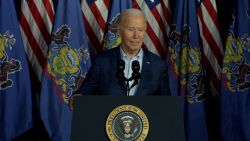President Donald Trump continued Tuesday to make false and baseless claims about hydroxychloroquine, the anti-malaria drug he has repeatedly promoted and now says he is himself taking.
At a Cabinet meeting on Tuesday, Trump falsely denied the existence of a Food and Drug Administration warning about the use of hydroxychloroquine for the coronavirus. And he claimed without any evidence that a study on veterans who were given the drug was conducted by political foes who had set out to hurt him.
The FDA warning
Trump was reminded by a reporter on Tuesday that the FDA has said hydroxychloroquine should not be used outside of a hospital setting or research studies.
Trump interjected: “No. That’s not what I was told. No.”
Facts First: The reporter was right. The FDA issued a safety warning on April 24 that was headlined, “FDA cautions against use of hydroxychloroquine or chloroquine for COVID-19 outside of the hospital setting or a clinical trial due to risk of heart rhythm problems.”
We don’t know what Trump might have been personally told, but he was incorrect when he said “no” in response to the reporter’s accurate premise.
The study of veterans
Trump lambasted a study that had found no benefit from hydroxychloroquine in a group of veterans with the coronavirus who were given the drug. He called it a “phony study” and said it was done by “obviously not friends of the administration” who wanted to “make political points.”
The President made similar comments earlier on Tuesday, speaking of an unspecified “bad survey” that was “a Trump enemy statement.” On Monday, he claimed the study at the VA was done by “people that aren’t big Trump fans.”
He also complained Tuesday that the drug had been given to people who were “old” and “ready to die.”
Facts First: There is no evident basis for Trump’s claims that the study of veterans was designed to hurt him. While there are valid criticisms of the study – which was small, retrospective, focused on seriously ill patients, not peer-reviewed and not randomized or controlled – Trump has provided no proof for his claims of some sort of political plot. The authors of the study explicitly acknowledged that it has significant limitations. Larger, peer-reviewed studies have also concluded that hydroxychloroquine has not benefited coronavirus patients.
The study at the VA, conducted by researchers at the University of South Carolina, the University of Virginia and the Dorn Research Institute in South Carolina, looked at the medical data of 368 male patients at veterans’ health centers – 97 patients who took hydroxychloroquine, 113 who took hydroxychloroquine and the antibiotic azithromycin, and 158 patients who did not. The patients who took hydroxychloroquine alone had a 27.8% death rate, while those who didn’t take the drug had an 11.4% death rate. The study also found that patients who took the drug were not significantly less likely to need mechanical ventilation.
The study was published on the medical website medRxiv, not a peer-reviewed journal. Secretary of Veterans Affairs Robert Wilkie has noted that the study looked at “a small number of veterans” who were “in the last stages of life.” VA spokesperson Christine Noel told NBC that hydroxychloroquine was “provided to VA’s sickest COVID-19 patients, many times as a last resort.”
“It is possible that the sicker patients received more medication than did the people who were less sick, and therefore these retrospective studies are a guide, but they are not definitive,” Dr. William Schaffner, a Vanderbilt University medical professor and expert in infectious diseases, said on CNN Tuesday after Trump’s comments, saying that “more careful studies are needed.”
The authors of the study, who did not respond to CNN’s requests for comment, wrote effectively the same thing in the study itself: “These findings highlight the importance of awaiting the results of ongoing prospective, randomized, controlled studies before widespread adoption of these drugs.” They also openly discussed specific limitations of their study. For example, they wrote that since they were looking at a majority-black group of males with a median age over 65, their findings might not be applicable to women, younger people and other groups.
A number of randomized, controlled trials are underway around the US and elsewhere to more conclusively determine the effectiveness of hydroxychloroquine for the coronavirus. (The drug is already FDA-approved for use against malaria, lupus and rheumatoid arthritis.) It’s worth noting, though, that the study of the veterans was not the only one to date that did not find hydroxychloroquine effective as a coronavirus treatment.
A University of Albany study of 1,438 patients with coronavirus at 25 hospitals in the New York City area, which was published in the Journal of the American Medical Association, found similar death rates for people who took hydroxychloroquine (or hydroxychloroquine plus azithromycin) and those who did not. It also found patients who took the drug combination were more than twice as likely to suffer cardiac arrest during the course of the study.
A study conducted by the New York-Presbyterian Hospital and Columbia University Irving Medical Center and published in the New England Journal of Medicine, which assessed 1,376 consecutive patients, also did not find improved outcomes from hydroxychloroquine.
David Shulkin, Trump’s former VA secretary, said on Twitter after the President’s remarks on Tuesday: “The risks of taking hydroxychloroquine are real, yet no data has shown it’s effective for COViD19. Thats why this should only be used now within ongoing clinical trials. I worry about the example being set and whether others may take the drug inappropriately.”

















